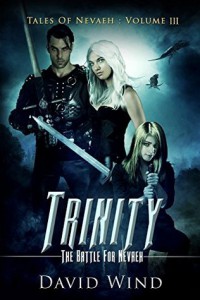Today I’m reviewing the third book in epic fantasy series Tales of Nevaeh, a series which I’m a fan of. Please also see my reviews for the first and second books in the series by clicking on the links at the bottom.
The third book in Tales of Nevaeh, David Wind’s Epic Fantasy series, focuses a lot more on magical realism by taking paranormal psychic warfare to the next step. This opened speculative possibilities about what would be real unless psychic-warrior partners Areenna and Mikaal took action to prevent the Dark Masters’ conquest of Nevaeh. This is made difficult by the fact that both Areenna and Mikaal become increasingly distrustful of The Eight sorceresses and other grand supposedly benevolent natural forces, who they must rely on to prevail. The Dark Masters know who Mikaal and Areenna are and plan to use their fondness for one another against them both. However, what the Masters’ don’t know is that there is a mysterious third person giving the psychic-warriors the edge in battle that could well thwart their conquest of Nevaeh.
As with Born to Magic, the first book, Areenna and Mikaal must contend with a witch; this time the witch’s (Lessig) background and relative importance as an evil rising power is made clear at the outset. I liked the visions provided by The Eight, which showed what would happen if Lessig was tackled in different ways. Trinity is split into two parts, Book One and Book Two, the latter being where the adventure really began for me and it did so with astounding revelation of Nevaeh’s past and present. The last 25% was rife with raw anticipation, as the final battle looms and strategy meets counter-strategy. Through third-person omniscient point-of-view and ever reliable mutant-animal aoutems such as the flying Gaalrie; we experience the glorious battles and impending fate of Nevaeh. The extremely well-conceived epic battle at the end had excellent build-up and delivery of outstanding writing.
Criticism: The language ‘I know not how’, though sounding authentic, was done a bit too often and gave a stilted effect. Some common themes slowed the progression of the plot: the movements of the numerous characters and the devotion between Areenna and Mikaal sometimes didn’t represent change in their relationship. Entering forests, discovering deception, and then aiming for a resolution repeated often. Admittedly this could be because this is the third book in this series I have read and the themes are becoming very familiar. Born to Magic #1 and Dark Masters #2 had evil coupled with great journeys of discovery, but I felt Trinity was a psychic game of chess until the battles commenced.
Overall, there was much in Trinity to applaud. There was revelation about the state of Nevaeh, and possibilities about what evil plans could befall it as the forces of good and evil prepare for a final clash. I immensely enjoyed the final battle, which is comparable in impact to the one at the culmination of the Lord of the Rings. My reservations about Trinity were because of its focus on psychic powers and preparation than on adventure. However, if you’re into this series as I am then there isn’t a compelling reason to not read Trinity.

